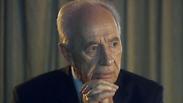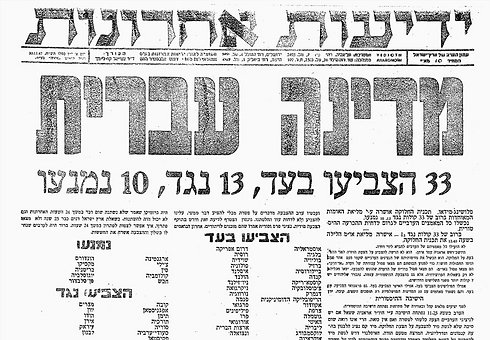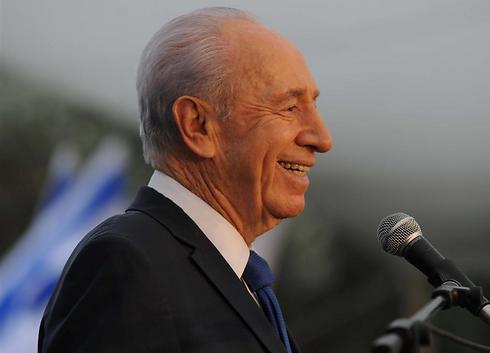
Peres recalls declaration of independence: We didn't have time to celebrate
In honor of Yedioth Ahronoth's 75th anniversary, ex-Israeli president sits down for interview, recalls headlines of Israelis establishment, offers glimpse into true story behind them: "Ben Gurion told me "today, everyone's happy. Tomorrow, blood will be spilled".'
"Even now, when I read this again, I'm saying, 'this is how making history sounds like.' There was a feeling of exaltation. In the strip below the headline it says: 'Long live the Jewish and independent state! Long live the first government! Am Yisrael Chai!' There was no cynicism then, there was enormous honesty and excitement."
And yet, the former president says, the celebratory words hide a complicated situation and the day of the state's declaration was filled with tensions.
"In that regard, it was an empty headline. Until the very last moment, there were massive arguments about the declaration. There were many who objected, and it was determined in the people's council in a very close vote, five versus six. The objection mostly revolved around the Partition Plan and the small size of the state. We always want to eat the entire cake. I don't know if there was anyone else but Ben-Gurion who was willing to take on the announcement. But Ben-Gurion made a decision. It wasn't easy for him."
What were the arguments about?
"Ben-Gurion instructed Pinchas Rosen, who was the Justice Minister, to write the Declaration of Independence and they kept arguing. Every word there was accompanied by arguments. For example, how to define the word "God." They wrote "Israel's rock and savior" to satisfy both the religious and secular, who didn't want us to be a theocratic state. Ben-Gurion was against a constitution. He told me, 'if this generation writes a constitution, it'll bind the generations to come. We'll write the constitution when we're older and more like a state.' Ben-Gurion believed you can't do everything at once, because then you don't achieve anything. That's why he made a speech. He read out the Declaration of Independence from the written text and said everything he believed in there."
Where were you when these arguments were happening?
"Outside. At that time I was focused on one issue, security. Exactly a year earlier, in 1947, Ben-Gurion brought me from Kibbutz Alumot to handle that issue. We had no doubt a war will break out soon after the declaration of the state, and that's also what happened. You can see it in the Yedioth Ahronoth headlines: On Friday, May 14, the headline reports on the declaration, and on Sunday it's already talking about the fierce battles."
Where were you during the declaration itself, at the Dizengoff House on Rothschild Boulevard?
"I didn't join Ben-Gurion for the declaration. I stayed in the general headquarters in the 'Red House' on HaYarkon street. I was dealing with recruitment, with preparations for the fighting. We were receiving telegrams and news reports every moment. I was working 24 hours a day. We were afraid we wouldn't have weapons to defend ourselves, and that we wouldn't have enough fighters.
"I didn't have time to go to ceremonies and I heard the declaration of independence on the radio. I couldn't look up from my desk. I was handling endless amount of volunteers from the kibbutzim and moshavim, new immigrants who didn't know a word of Hebrew or how to hold a weapon. We sent them straight to the battle field."
Israel remains as it was, and in its very first day a "Security Bond" was announced.
"I remember how this thing started," Peres says. "One day a boy celebrating his bar mitzvah came to the Defense Ministry and gave me a gold watch. He said, 'I got this as a gift and I'm giving it to the defense of Israel.' The story was immediately reported and they decided on a security bond right away. This is what we did that day. It was obvious a war will break out the next day."
And the happiness? The celebrations?
"We didn't have time to rejoice. In the night of the declaration I was supposed to brief Ben-Gurion. I came to him at King David hotel in Jerusalem. He was serious. A heavy burden sat on his shoulders. He told me, 'today, everyone's happy. Tomorrow, blood will be spilled.' He had to both declare independence and not be afraid of the war, when we had zero tools and few people on our side. He fought like a lion."
How to you think Ben-Gurion would've reacted to what's going on in Israel today?
"He always thought that what we had wasn't enough, that we have yet to reach perfection. One time I went to a school in Dimona with him. A black-eyed girl from the 5th grade got up and told him, 'Mr. Ben-Gurion, when was the happiest day of your life?' He said, 'What, contentment? That's what you're asking? Never. I didn't have any day of contentment.'
"In his old days, he was disappointed and now we understand why. He was afraid we couldn't shake off the exile mindset, he feared of rifts and splitting, from the arguments between the Jews, from corruption. He thought we had great prophets, great judges, great priests - but we didn't have great statesmen and he was afraid of the lack of statesmanship. At the same time, Ben-Gurion had a dream. The reality created of this dream is bigger than the declaration of independence."
And you?
"I was born and optimist and that's also how I'll die. It's not that there are no moments in which I am fearful, but I think that even today we can solve the problems. I don't think we're lost, but with a different policy we could've brought peace. Just like we couldn't establish a state without international legitimization, it's hard to sustain a state without international legitimization. And the key is peace."












